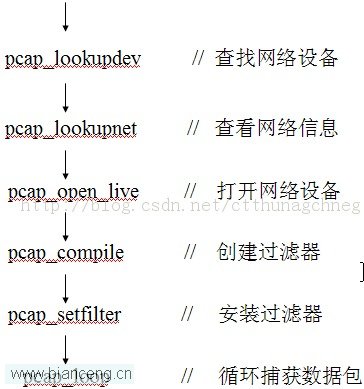網絡數據包檢測
數據包捕獲(sniffer):是指在網絡上進行數據收集的行為,需要通過網卡來完成。
三種訪問方式:
BSD Packet Filter(BPF)
SVR4 Datalink Provider Interface(DLPI)
linux SOCK_PACKET interface
libpcap庫
安裝:
apt-get install libpcap-dev
常用API
捕獲數據包
查找缺省的用來捕獲數據網絡設備
char * pcap_lookupdev ( char * errbuf )//出錯時保存系統返回的錯誤信息。
返回值:
成功時返回指向設備名稱的指針,
失敗返回NULL
查找指定設備的網絡號和子網掩碼
int pcap_lookupnet( const char * device,//指向設備名稱的指針
bpf_u_int32 * netp,//指向獲取的網絡號的指針
bpf_u_int32 * maskp,//指向獲取的子網掩碼的指針
char * errbuf)//出錯時保存系統返回的錯誤信息
返回值:
成功返回0,
失敗返回-1,並保存錯誤信息到errbuf中。
打開一個網絡設備用於捕獲數據包
pcap_t * pcap_open_live( const char * device,//指向設備名稱的指針
int snaplen, //捕獲的數據包的長度
int promisc,//網絡接口工作模式
int to_ms,//讀取數據包時的超時
char * errbuf)//出錯時保存系統錯誤信息
返回值:
成功返回捕獲數據包的句柄
失敗返回NULL並保存錯誤信息到errbuf中
捕獲下一幀數據
const u_char * pcap_next ( pcap_t * p//pcap_open_live返回的句柄
struct pcap_pkthdr * h)保存捕獲的數據包屬性的結構體指針
返回值:
成功時返回捕獲的數據幀的指針,
失敗或無數據返回NULL。
循環捕獲多幀數據並處理
typedef void ( * pcap_handler )( u_char *user,
const struct pcap_pkthdr * h,const u_char *bytes);
int pcap_loop( pcap_t * p,//pcap_open_live返回的句柄
int cnt,//要捕獲的數據幀的個數
pcap_handler callback,//捕獲到一幀數據時執行的處理函數
u_char * user )//傳遞給callback的參數
查看本欄目更多精彩內容:http://www.bianceng.cn/OS/unix/
返回值:
成功返回0,
失敗返回-1,
被中斷返回-2.
過濾數據包
根據過濾器表達式生成過濾器
int * pcap_compile( pcap_t * p,//pcap_open_live返回的句柄
struct bpf_program * fp,//保存過濾器的結構體指針
const char * str,//要轉換的過濾器表達式
int optimize,//過濾程序是否優化
bpf_u_int32 netmask )//子網掩碼
返回值:
成功返回0,
失敗返回-1。
為指定的捕捉句柄安裝過濾器
int pcap_next ( pcap_t * p//pcap_open_live返回的句柄
struct bpf_program * fp);//指向要安裝的過濾器的指針
返回值:
成功返回0;
失敗返回-1.
捕獲數據包流程

示例程序:
//ping.c
#include <stdio.h>
#include <stdlib.h>
#include <string.h>
#include <signal.h>
#include <arpa/inet.h>
#include <sys/types.h>
#include <sys/socket.h>
#include <unistd.h>
#include <netinet/in.h>
#include <netinet/ip.h>
#include <netinet/ip_icmp.h>
#include <netdb.h>
#include <setjmp.h>
#include <errno.h>
#define PACKET_SIZE 4096
#define MAX_WAIT_TIME 5
#define MAX_NO_PACKETS 3
char sendpacket[PACKET_SIZE];
char recvpacket[PACKET_SIZE];
int sockfd,datalen=56;
int nsend=0,nreceived=0;
struct sockaddr_in dest_addr;
pid_t pid;
struct sockaddr_in from;
struct timeval tvrecv;
void f(int signo) {}
void statistics(int signo);
unsigned short cal_chksum(unsigned short *addr,int len);
int pack(int pack_no);
void send_packet(void);
void recv_packet(void);
int unpack(char *buf,int len);
void tv_sub(struct timeval *out,struct timeval *in);
void statistics(int signo)
{
printf("\n--------------------PING statistics-------------------\n");
printf("%d packets transmitted, %d received , %%%.2f lost\n",nsend,nreceived,(float)(nsend-nreceived)/nsend*100);
close(sockfd);
exit(1);
}
/*校驗和算法*/
unsigned short cal_chksum(unsigned short *addr,int len)
{
int nleft=len;
int sum=0;
unsigned short *w=addr;
unsigned short answer=0;
/*把ICMP報頭二進制數據以2字節為單位累加起來*/
while(nleft>1)
{
sum+=*w++;
nleft-=2;
}
/*若ICMP報頭為奇數個字節,會剩下最後一字節。把最後一個字節視為一個2字節數據的高字節,
這個2字節數據的低字節為0,繼續累加*/
if( nleft==1)
{
*(unsigned char *)(&answer)=*(unsigned char *)w;
sum+=answer;
}
sum=(sum>>16)+(sum&0xffff);
sum+=(sum>>16);
answer=~sum;
return answer;
}
/*設置ICMP報頭*/
int pack(int pack_no)
{
int i,packsize;
struct icmp *icmp;
struct timeval *tval;
icmp=(struct icmp*)sendpacket; //char sendpacket[4096];
icmp->icmp_type=ICMP_ECHO;
icmp->icmp_code=0;
#if 1
icmp->icmp_seq=pack_no;
icmp->icmp_cksum = 0;
#endif
icmp->icmp_id=pid;
packsize=8+datalen;
tval= (struct timeval *)icmp->icmp_data;
gettimeofday(tval,NULL); /*記錄發送時間*/
icmp->icmp_cksum=cal_chksum( (unsigned short *)icmp,packsize); /*校驗算法*/
return packsize;
}
/*發送三個ICMP報文*/
void send_packet()
{
int packetsize;
//while(nsend)
//{
nsend++;
packetsize=pack(nsend); /*設置ICMP報頭*/
if(sendto(sockfd,sendpacket,packetsize,0,(struct sockaddr *)&dest_addr,sizeof(dest_addr))<0 )
{
perror("sendto error");
return;
}
// sleep(1); /*每隔一秒發送一個ICMP報文*/
// }
}
/*接收所有ICMP報文*/
void recv_packet()
{
int n,fromlen;
extern int errno;
struct sigaction act;
sigaction(SIGALRM, NULL, &act);
act.sa_handler = f;
sigaction(SIGALRM, &act, NULL);
fromlen=sizeof(from);
while(1)
{
alarm(5);
if( (n=recvfrom(sockfd,recvpacket,sizeof(recvpacket),0,(struct sockaddr *)&from,&fromlen)) <0)
{
if (errno == EINTR)
{
printf("errno=%d\n", errno);
break;
}
else
exit(-1);
}
gettimeofday(&tvrecv,NULL); /*記錄接收時間*/
if(unpack(recvpacket,n)==-1)
{
continue;
}
else
{
nreceived++;
break;
}
}
}
/*剝去ICMP報頭*/
int unpack(char *buf,int len)
{
int i,iphdrlen;
struct ip *ip;
struct icmp *icmp;
struct timeval *tvsend;
double rtt;
ip=(struct ip *)buf;
iphdrlen=ip->ip_hl<<2; /*求ip報頭長度,即ip報頭的長度標志乘4*/
icmp=(struct icmp *)(buf+iphdrlen); /*越過ip報頭,指向ICMP報頭*/
len-=iphdrlen; /*ICMP報頭及ICMP數據報的總長度*/
if(len<8) /*小於ICMP報頭長度則不合理*/
{
printf("ICMP packets\'s length is less than 8\n");
return -1;
}
/*確保所接收的是我所發的的ICMP的回應*/
if( (icmp->icmp_type==ICMP_ECHOREPLY) && (icmp->icmp_id==pid) )
{
tvsend=(struct timeval *)icmp->icmp_data;
tv_sub(&tvrecv,tvsend); /*接收和發送的時間差*/
rtt=tvrecv.tv_sec*1000+(float)tvrecv.tv_usec/1000; /*以毫秒為單位計算rtt*/
/*顯示相關信息*/
printf("%d byte from %s: icmp_seq=%u ttl=%d rtt=%.3f ms\n",
len,inet_ntoa(from.sin_addr),icmp->icmp_seq,ip->ip_ttl,rtt);
}
else return -1;
}
int main(int argc,char *argv[])
{
struct hostent *host;
struct protoent *protocol;
unsigned long inaddr=0l;
int waittime=MAX_WAIT_TIME;
int size=50*1024;
if(argc<2)
{
printf("usage:%s hostname/IP address\n",argv[0]);
exit(1);
}
if( (protocol=getprotobyname("icmp") )==NULL)
{
perror("getprotobyname");
exit(1);
}
/*生成使用ICMP的原始套接字,這種套接字只有root才能生成*/
if( (sockfd=socket(AF_INET,SOCK_RAW,protocol->p_proto) )<0)
{
perror("socket error");
exit(1);
}
/* 回收root權限,設置當前用戶權限*/
setuid(getuid());
/*擴大套接字接收緩沖區到50K這樣做主要為了減小接收緩沖區溢出的
的可能性,若無意中ping一個廣播地址或多播地址,將會引來大量應答*/
setsockopt(sockfd,SOL_SOCKET,SO_RCVBUF,&size,sizeof(size) );
bzero(&dest_addr,sizeof(dest_addr));
dest_addr.sin_family=AF_INET;
/*判斷是主機名還是ip地址*/
if( (inaddr=inet_addr(argv[1]))==INADDR_NONE)
{
if((host=gethostbyname(argv[1]) )==NULL) /*是主機名*/
{
perror("gethostbyname error");
exit(1);
}
memcpy( (char *)&dest_addr.sin_addr,host->h_addr,host->h_length);
}
else /*是ip地址*/
dest_addr.sin_addr.s_addr = inaddr;
//memcpy( (char *)&dest_addr,(char *)&inaddr,host->h_length);
/*獲取main的進程id,用於設置ICMP的標志符*/
pid=getpid();
printf("PING %s(%s): %d bytes data in ICMP packets.\n",argv[1],
inet_ntoa(dest_addr.sin_addr),datalen);
int i = 0;
bzero(sendpacket, PACKET_SIZE);
bzero(recvpacket, PACKET_SIZE);
while (i < 3)
{
send_packet(); /*發送所有ICMP報文*/
recv_packet(); /*接收所有ICMP報文*/
sleep(1);
i++;
}
statistics(SIGALRM); /*進行統計*/
return 0;
}
/*兩個timeval結構相減*/
void tv_sub(struct timeval *out,struct timeval *in)
{
if( (out->tv_usec-=in->tv_usec)<0)
{
--out->tv_sec;
out->tv_usec+=1000000;
}
out->tv_sec-=in->tv_sec;
}
/*------------- The End -----------*/
查看本欄目更多精彩內容:http://www.bianceng.cn/OS/unix/
//cap.c
#include <stdio.h>
#include <stdlib.h>
#include <string.h>
#include <pcap.h>
#define MAXBYTES2CAPTURE 2048
void process_packet(u_char *arg, const struct pcap_pkthdr *pkthdr,
const u_char *packet)
{
int i = 0, *counter = (int *)arg;
printf("packet count:%d\n", ++(*counter));
printf("received packet size %d\n", pkthdr->len);
printf("payload\n");
for (i = 0; i < pkthdr->len; i++)
{
printf("%02x ", (unsigned int)packet[i]);
if ((i % 16 == 15 && i != 0) || (i == pkthdr->len-1))
printf("\n");
}
printf("\n\n**************\n");
return;
}
int main(int argc, char *argv[])
{
int i = 0, count = 0;
pcap_t *descr = NULL;
char errbuf[PCAP_ERRBUF_SIZE], *device = NULL;
bpf_u_int32 netaddr = 0, mask = 0;
struct bpf_program filter;
memset(errbuf, 0, sizeof(errbuf));
if (argc != 2)
device = pcap_lookupdev(errbuf);
else
device = argv[1];
printf("Try to open device %s\n", device);
if ((descr = pcap_open_live(device, MAXBYTES2CAPTURE, 1, 0, errbuf)) == NULL )
{
printf("error:%s\n", errbuf);
exit(-1);
}
printf("pcap_open\n");
pcap_lookupnet(device, &netaddr, &mask, errbuf);
printf("pcap_look\n");
//if (pcap_compile(descr, &filter, "arp and ether host 00:0c:29:b7:f6:33", 0, mask) < 0)
if (pcap_compile(descr, &filter, "arp and ether host 00:0c:29:cd:d6:dd", 0, mask) < 0)
{
printf("pcap_compile error\n");
exit(-1);
}
printf("compile\n");
pcap_setfilter(descr, &filter);
printf("setfilter\n");
pcap_loop(descr, 1, process_packet, (u_char *)&count);
return 0;
}
作者:csdn博客 ctthuangcheng